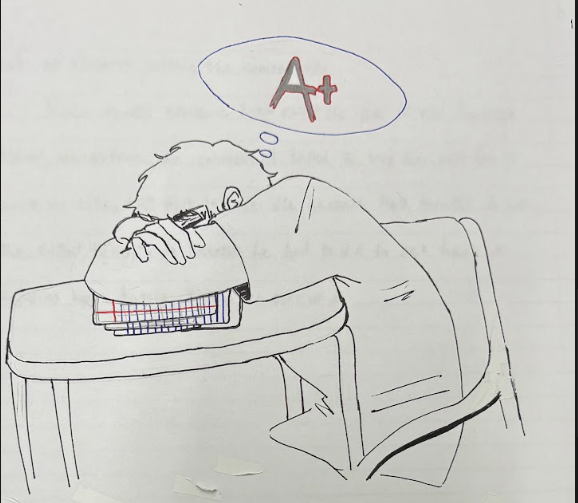The Bullseye • September 16, 2025 • https://nvhspress.org/2145/uncategorized/the-price-of-as/
The Price of A’s
10th, 11th, and 12th graders often sacrifice sleep to achieve good grades and academic success.

At the end of the day, school never seems to end for plenty of students. Many students have to do homework, go to work, participate in sports, or take care of familial responsibilities. When you get further along in high school, the pressure to have good grades becomes an even larger priority. As a result, sacrificing sleep causes you to lack certain abilities.
Arnold Audittore, a 10th grader in advanced classes, notices the challenge. “I have two and a half to three hours of homework each night,” says Audittore. Audittore plays soccer, goes to bed around 10 PM, and wakes up at 7:20 AM for school, which makes him feel “tired and less focused.” This ends up affecting his performance at school; his experience shows that a vigorous amount of work and an early bedtime affect the student’s capabilities at school.
However, Edgar Montalvo, a 10th grader in regular classes, has a different story to tell. “Nah, I feel I just get them [good grades] easily,” said Montalvo. He gets about an hour of homework done per night, and goes to bed around midnight, waking up at 7:30 am. For him, the lack of sleep is not a problem.
The situation starts to get worse once you get even deeper into high school. Nathaniel Miller, an 11th grader taking regular classes, says that he stays up to midnight and wakes up at 6 am. While his workload is only about an hour each night, the lack of sleep makes him so tired during the school day that he often ends up sleeping in classes. His perspective shows that having a reduced sleep schedule can affect the student’s ability to learn.
The experience is different for students in advanced classes, however. Madox Saucedo, also an 11th grader, says that while he has “maybe an hour worth” of homework, it ends up taking two or three hours to complete because he can’t focus. The lack of focus, he explained, is a result of not getting enough sleep, which sometimes makes him “kind of cranky.” He feels that he has to keep on going to school every day with only 4 and a half hours of sleep on a bad night, just to get everything done.
By the time they reach 12th grade, students’ relationships with sleep become more complicated. Andrew Garcia, a 12th grader, explains that his schedule is largely impacted by the work he needs to get done. “I wake up bad, like five to six, usually,” says Garcia. When asking how many hours of homework he has each night, Garcia says, “An hour, maybe.” Garcia also talks about how, even with a light homework load, the lack of sleep affects him at school.
For Celerina Pena, a 12th grader in advanced classes, she experiences something different. She explains how she typically goes to bed between 9:30 pm and 10 pm and wakes up at 5:30 am to manage her homework. While she has an average of one to two hours of homework, some nights it can be up to four to five hours. Despite the pressure to keep good grades, she says she prioritizes sleep. This shows that even though there’s a lot of academic pressure, some students, like Pena, try to protect their sleep schedule, even if it makes them risk getting a little behind on their homework.
The stories of the upperclassmen show us that sleep deprivation isn’t just because of a busy schedule, but that it’s an issue that involves academic expectations. As students progress, the expectations of academic success increase and start to affect them.